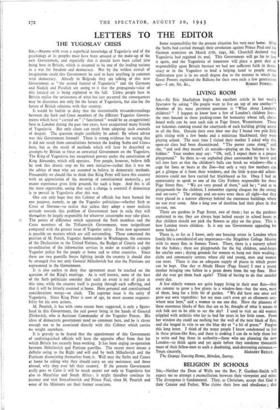IHE YUGOSLAV CRISIS
LETTERS TO THE EDITOR
Sta,—Anyone with even a superficial knowledge of Yugoslavia and of the psychology of its peoples must have been amazed at the make-up of the new Government, and especially that it should have been called into being here in Britain, which is assumed to be one of the leading nations in a war for freedom and democracy. Not by the wildest stretch of imagination could this Government be said to have anything in common with democracy. Already in Belgrade they are talking of this new Government as " the second funeral of Yugoslavia " and the Germans and Nedich and Pavelich are seeing to it that the propaganda-value of this farcical act is being exploited to the full. Unless people here in Britain realise the seriousness of what has just occurred the consequences may be disastrous not only for the future of Yugoslavia, but also for the future of British relations with that country.
It would be foolish to deny that the interminable misunderstandings between the Serb and Croat members of the different Yugoslav Govern- ments which have " carried on " (" functioned " would be an exaggeration) here in London during the past two years, have exasperated many friends of Yugoslavia. But only chaos can result from adopting such counsels of despair. The question might justifiably be asked: By whose advice was this Government formed? There is strong evidence for saying that it did not result from consultations between the leading Serbs and Croats here, but as the result of methods which will later be described as attempts by Britain to force an unwanted Government on the Yugoslays. The King of Yugoslavia has exceptional powers under the constitution of King Alexander, which still operates. Few people, however, believe this he took this drastic step on his own initiative—rather that it was on the advice of men who are assumed to believe in democratic methods. Presumably we should like to think that King Peter will leave this country with an appreciation of the meaning of constitutional monarchy , yet recent experience gives little grounds for such a hope. And this is all the more regrettable, seeing that such a change is essential if democracy is to prevail in Yugoslavia after this war.
One can only hope that this Cabinet of officials has been formed for one purpose, namely, to gat the Yugoslav politicians—whether Serb or Croat or Slovene—to realise that unless they adopt a more realistic attitude towards this problem of Government here in exile they will themselves be largely responsible for whatever catastrophe may take place. The points of difference which separated the Serb members and the Croat members of the Trifunovich Government, were insignificant compared with the greater issue of Yugoslav unity. Even now agreement is possible on matters which are still outstanding. These concerned the position of M. Fotich, Yugoslav Ambassador in Washington, the contents of the Declaration to the United Nations, the Budget of Croatia and the co-ordination of the information services in order to establish a single Yugoslav policy for the people at home and to other countries. Since there are two guerrilla forces fighting inside the country it should also be arranged that not only General Mihailovich but also the Partisans are represented in the Government.
It is also useless to deny that agreement must be reached on the question of the King's marriage. As is well known, some of the best of the Serb politicians consider that such an event is out of place at this time, while the country itself is passing through such suffering, and that it will be bitterly resented at home. Here personal and constitutional considerations merge—or clash. The supreme issue is the unity of Yugoslavia. Since King Peter is now of age, he must assume responsi- bility for his own actions.
M. Pourich, it has with some reason been suggested, is only a figure- head in this Government, the real power being in the hands of General Zhitkovich, who is Assistant Commander of the Yugoslav Forces. His ideas of democratic government need no comment here, and he is clever enough not to be associated directly with this Cabinet which carries no weight anywhere.
It is gravely to be feared that the appointment of this Government of undistinguished officials will have the opposite effect from that for which Britain has recently been working. It has been urging co-operation between Mihailovich and Partisan guerillas. The recent move means a definite swing to the Right and will end by both Mihailovich and the Partisans dissociating themselves from it. Well may the Serbs and Croats at home be asking why they should carry on any resistance, and those abroad, why they ever left their country. If the present Government really goes to Cairo it will be much nearer not only to Yugoslavia but also to Mauritius and South Africa ; it might therefore continue its journey and visit Stoyadinovich and Prince Paul, since M. Pourich and some of his Ministers are their former associates.
Some responsibility for the present situation lies very near home. After the Serbs had carried through their revolution against Prince Paul and his German associates on March 27th, 1941, Mr. Churchill declared that Yugoslavia had regained its soul. This Government will go far to lose it again, and the Yugoslavia of tomorrow will place a great deal of responsibility upon Britain because we had not sufficient faith in demo- cracy or in the Yugoslays to lend a helping hand to people whose unfortunate past is in no small degree due to the manner in which the Great Powers exploited the Balkans for their own ends a few generations


























 Previous page
Previous page